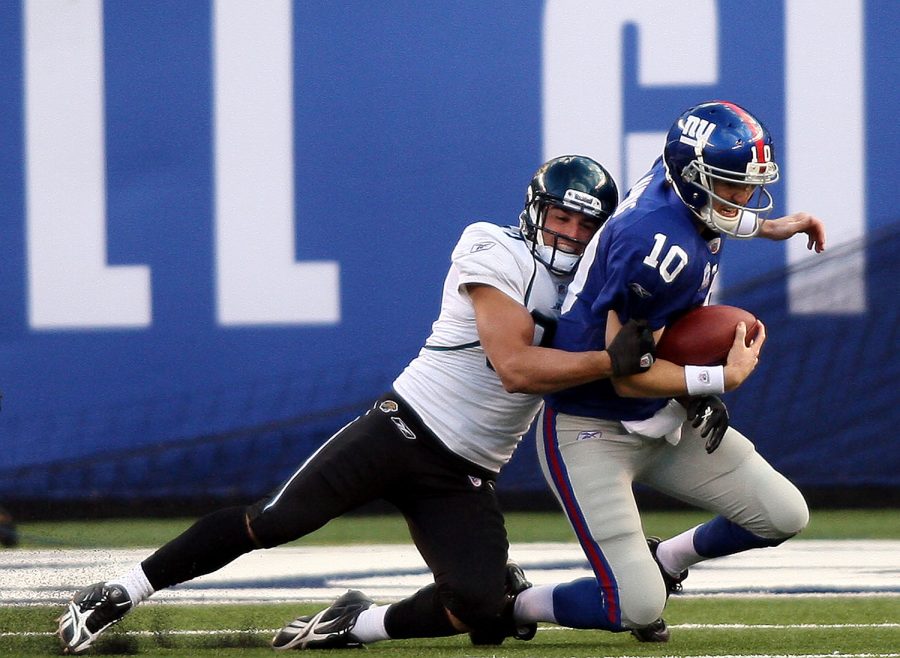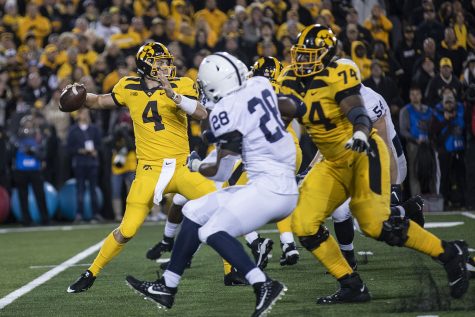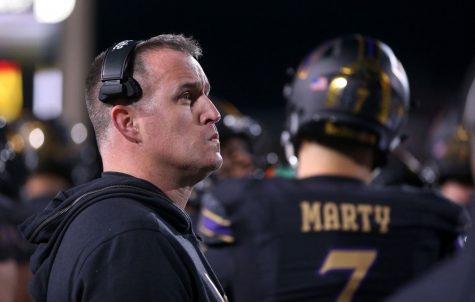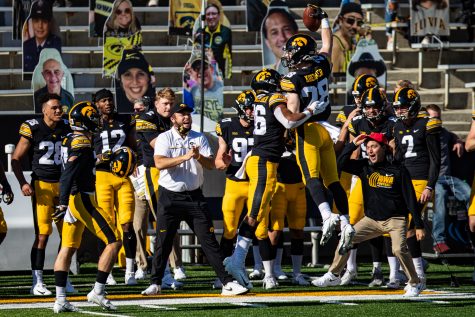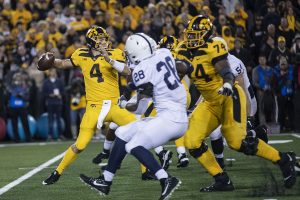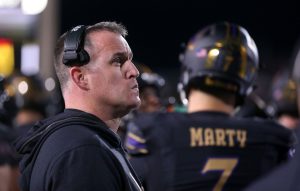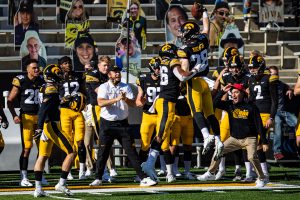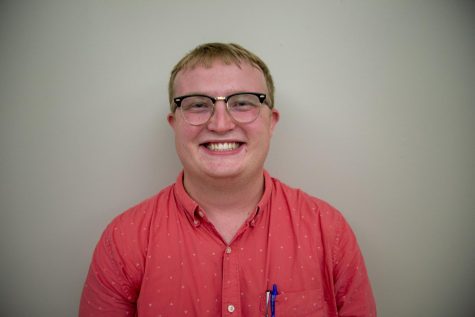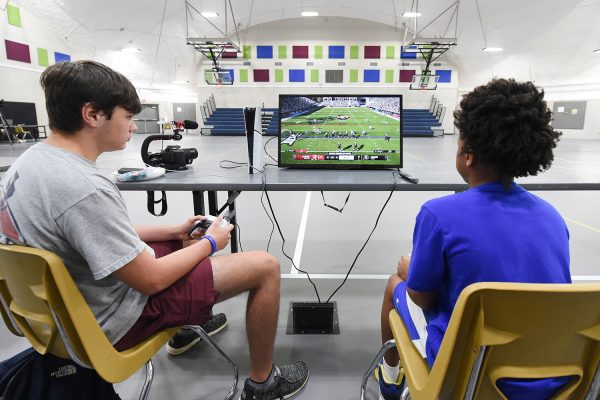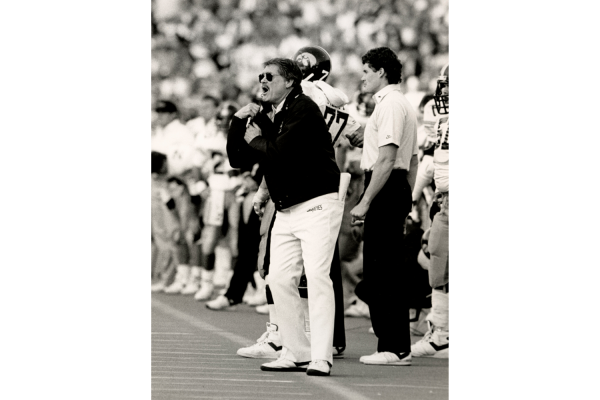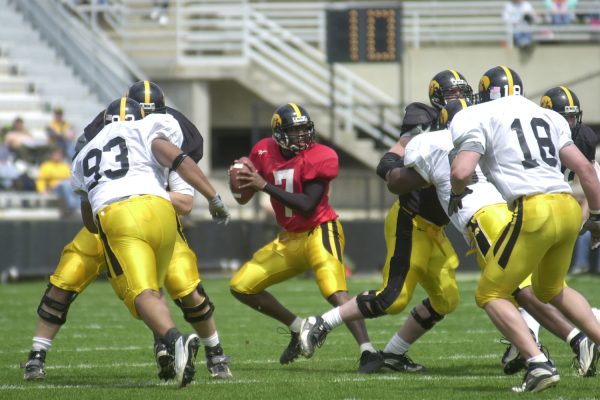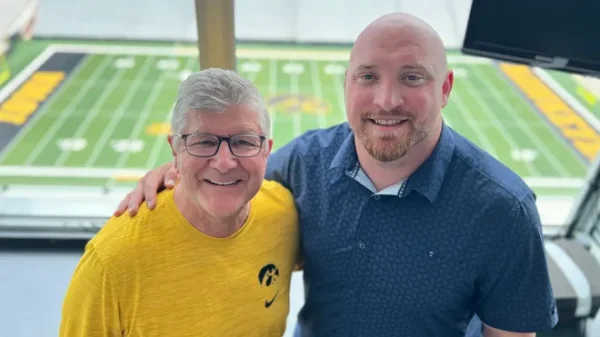One-on-one with former Iowa defensive back Sean Considine
DI Sports Editor Austin Hanson talks to the former Hawkeye safety about his memorable game against Penn State in 2004.
Jacksonville Jaguars’ Sean Considine sacks New York Giants quarterback Eli Manning during NFL action at the New Meadowlands Stadium in East Rutherford, New Jersey, Sunday November 28, 2010. The Giants won, 24-20. (Joe Rogate/Newsday/MCT)
November 19, 2020
The Daily Iowan: You joined the Iowa football team as a walk-on in 2000. Did you ever imagine that you would become a starter and even go pro at that point?
Sean Considine: No, not at all. I walked on at the University of Iowa and I’m not sure I would’ve had the confidence to do it on my own, but my dad played Division I football at Northern Illinois University and they actually recruited me pretty extensively coming out of high school. At the last second, they asked me to walk on to Northern and so I kind of went into a scramble, and my dad was the one who said, ‘Hey, if you’re going to walk on at a program, instead of walking on to a MAC level school, why don’t you look into the Big Ten schools?’ And I had pretty good grades and stuff like that so I got accepted at places like Purdue and Iowa and some other schools that I was interested in and ended up out there in Iowa City, and I was just hoping to somehow make the team, let alone, playing in the NFL someday.
DI: How did you decide to come to Iowa?
Considine: Iowa showed the most interest in me as a walk-on, which wasn’t a whole lot. They guaranteed that they were going to give me a spot in training camp, which made me a preferred walk-on. Really, once I came out, it was very late in the process too, I came out and met Phil Parker and coach [Kirk] Ferentz. My parents and I, we just really had a good feeling about those guys. They were very open, very honest about the expectations of the program, what I’d have to do to have a chance to be a valuable member of the team. I loved the school of Iowa once I came out and visited the campus. I wanted to be a business major, so I liked the Tippie School of Business, everything they had to offer. It really just came down to believing in the people, and once I met Kirk Ferentz, he ended up being exactly who I thought he was, just a great guy, a man of character. I was very fortunate I ended up out there to play for him and his staff.
DI: What makes the Norm Parker, Phil Parker defense so successful? How has Iowa had such sustained success on the defensive side of the ball?
SC: I think with Norm, you know he was the defensive coordinator back then, the expectations were so high for what was expected, and what you were expected to do, and how you were expected to prepare for the games really resonated with me. Norm Parker really only ran one defense the entire game. So, we were just going to get so good at what we did, it did not matter if the offense knew how we were going to align and what coverage we had the whole game. We were just going to get very sound, technically, at what we did. As long as we were tough, physical, stop the run, we thought we could pretty much make the [opponent] go a long way to beat us. So, it was a very almost simple game plan, but it became very, very effective because of how good the players got and what they were expected to do.
DI: You were part of some pretty iconic moments at Iowa. When you look back at your time as a Hawkeye do you have one moment that stands out the most to you?
SC: We had so many unbelievable moments when we were out there. I’ll tell you what, when we won the Alamo Bowl in 2001, when we went down there to San Antonio, we’d come from such a tough spot. We knew what it felt like to lose. That was the first time in my life and football I had ever lost. When you’re a competitor and a guy that wants to be the best, and you’re around a bunch of other guys that were used to that, it just didn’t sit well with that group of guys. So, when we kind of felt that feeling in 2001 that everything that we were doing was working. The hard work was paying off. Iowa was respected again. I remember that feeling after that Alamo Bowl, and that was my first time being in a bowl game in college. A lot of my family and friends who knew I’d walked on at the University of Iowa were down there to see me playing on special teams and stuff like that. For me personally, it was just kind of like a validation of who we are, the way we were doing things, and that we were going to be successful. We didn’t settle for an Alamo Bowl victory. We wanted more. We wanted that Big Ten Championship. We wanted to break the rock and that happened the next year. Just an incredible, incredible experience for me personally and my teammates, considering where we had come from early on in coach Ferentz’s first couple years at Iowa.
DI: What do you remember about the early Kirk Ferentz years? Do they differ from what you see now, or is there much of a difference?
SC: [Ferentz] is pretty much the same guy he was in 1999 as he is today. That’s what makes him such an incredible human being is his foundation. I think he does things very similar to the way he’s always done things because he knows they work. A lot of people really respect who he is and how he does things. So, you know, [he’s] just an incredible guy and an incredible coach. I’ve had the privilege of playing for a lot of coaches throughout my lifetime and they’re all different, there’s no question about it. But, I always put coach Ferentz up there with any of them just as far as character, and being the type of guy that, when you listen to him talk, you really believed in what he was saying and you really trusted everything he said. So that’s kind of what I think of him.
DI: Obviously coach Ferentz’s father passed away the week of that 6-4 Penn State game. What was it like to have Kirk absent from practice for a few days? How did that change things in terms of routine?
SC: I remember that week vividly. When your leader has something like that happen, it affects everybody emotionally. We knew his father and we knew how close the relationship he had with him was. Coach Ferentz is a very emotional guy. So, when he had that happen we could see how it affected him, emotionally. We all respected that. We all have our own fathers and can imagine what the day is going to be like when you lose your father, how difficult it is – especially somebody that was so involved in your life and a leader in everything that you’ve done. Defensively, I don’t think it was that notable of him being out of practice. As you know, Norm Parker and his staff on defense [ran their own drills at practice for defensive players]. That’s one thing I’ve always respected about coach Ferentz. He really relied on his assistant coaches to do their job and do it well, and Norm Parker was basically the leader of our defense. I think most of the decisions were probably run by coach Ferentz, but I think Norm was in charge. So, we had a great week of preparation and just the entire team kind of rallied around coach Ferentz in that situation and just really wanted to find any way possible to win, and as you probably know, that game turned into being one of the most crazy, back-and-forth, defensive battle games that you might ever see. To go out there to Happy Valley, in [coach Ferentz’s] neck of the woods where he kind of grew up, and where he has just laid his father to rest. To win a ballgame 6-4 was just an incredible memory we all got to share together.
DI: Did you guys know that Kirk was going to be coaching that afternoon or was that kind of in question at some points during the week?
SC: I think we knew that he would be back for the game. I think that was important to him to be there, to do what was right for his family, but also be there to lead his football family into that game. So it was just a very emotional experience and just an incredible game, the way that game went throughout the whole day. Of all the games I ever played in college, that one is probably brought up the most besides the Capital One [Bowl], just because of the score of the game and the way that whole game went. ESPN seems to like to talk about that game quite a bit because of the unusual nature of the scoring.
DI: People still talk about that 6-4 game to this day. How does it make you feel having been a part of that game that it is still relevant up to this day?
SC: It’s just fun. The older you get, for me personally, I’m 39 years old, I got five little kids and they all want to know about their dad and his football career and stuff like that. As you get older, time moves on. We get to focus on other things, which is good, but it’s just kind of fun sometimes to be able to go back in time and talk about some of the experiences and the games that you played as a young man and the successes and victories. [The 6-4 game] is one of [the games] that gets brought up quite a bit. So, I’ve had the chance to tell the story of that 6-4 game, not only to a lot of the media and fans, but also to my own kids. This has kind of been a fun opportunity for me to share my football stories with a lot of different types of people.
DI: What do you think the formula was for 6-4? What factors contributed to that oddball score?
SC: Neither offense could get into rhythm. Both defenses had each other’s numbers. I think the one things that can’t happen in a game like that, that’s unfolding the way that one was, is you can’t give up big plays, you can’t turn the ball over in bad situations – which we did a nice job not to do that on our end – and then not give up any big plays on special teams. Sometimes in a game like that, we had the knack of finding a way to get a big punt return or kickoff return or whatever. I think Penn State’s kicker back then was Robbie Gould. We were hoping they kicked it to us to get return and he kicked them out of the end zone every time. So, we didn’t get a chance on special teams to be a difference-maker in that game like we would’ve liked to. But, we found ways to do it on defense. You know, we created a few turnovers, I think three of four interceptions. It was just one of those games. I remember I had an interception I ran down to like the ten of fifteen-yard line. You would assume we’d just go right in and score a touchdown, but I think it only turned into a field goal. It was just one of those games where points were at a premium.
DI: I wanted to ask you about that interception. What did you see on that play and how did you make that play?
SC: I think they ran a deep crosser. Phil Parker is just an unbelievable coach. He does a great job of calling defenses and teaching Xs and Os and stuff, but I think the one thing that maybe a lot of people don’t understand about Phil is, which I think is his best quality, he does a great job of teaching young football players how to study the game of football. In the film room, watching film doing all that type of stuff, and a lot of times when you do that at a very very high level, in certain down and distances and certain situations in a football game, you kind of know, as a defensive player, more than likely what’s about to happen next. I think [the interception] was one of those situations where they put themselves into a down and distance where I probably had a very good idea of what play was coming, and it came, and that’s where you get a chance to jump in front of the football, and you know, hopefully score. If I was a little faster I would have maybe gotten all the way [to the end zone], but I was coming off a foot injury. So, I actually didn’t even expect to play that game and I warmed up as if I would play. I told Phil I thought I could limp my way through the game, and I ended up playing and we did pretty well, so it worked out good.
DI: So you didn’t know you were actually going to be playing in that game until just before kickoff?
SC: I actually did not think I was going to play, and I believe my parents did not come out to the game because I told them it was a long drive and that more than likely I wasn’t going to play. I hadn’t practiced in like three weeks. I had a Lisfranc sprain in my foot, which almost ended my whole season. I almost had to get surgery, but ended up coming back into that game and just kind of between the adrenaline and taking a little bit of Tylenol or whatever, got through the game, and I was glad I did because it was a heck of a game to be a part of.
DI: When you made that interception, did you think you’d be setting up the game-winning score in the second quarter of the game?
SC: No, I mean, the way that game ended up turning out was just one of those things that kind of just a freak of football that happens. It was just one of those days where, offensively, that I can imagine when both teams on Sunday morning all get together as teams to study and grade the film as a unit, both [offenses] probably had a rough Sunday morning watching that game film. Thankfully for us in the defensive room, it was one of those games you can look back on and feel pretty good about.
DI: How would you assess Iowa’s defense this season?
SC: I think it looks like a Phil Parker-coached defense. The one thing I said early in the season, I think I tweeted about it, is that I thought the team looked a little bit young and inexperienced in certain areas. Somebody kind of got on me on Twitter about that. [They tweeted], ‘Oh, I thought we have six or seven seniors.’ But, the way I was looking, you know, situational football, when you get down into the red zone, I think it was Purdue just kept on going to the same wide receiver all the time. It just seemed to me that we had some young players that may be, at that point of the football season without have training camp and all that stuff, just didn’t have enough time to gain the experience and knowledge that you would need in Phil’s defense to really start taking away things that offense is clearly showing you that they’re doing. That just comes with experience.
Since then, I think you’re starting to see, Phil Parker is an unbelievable teacher. You got to remember that about football coaches. They’re teachers. The best coaches are the best teachers. I mean, they could teach calculus, physics, or whatever. I’m convinced that they can do very well because that’s what they’re good at: teaching. So, I can already see that this team is learning from the mistakes of the past, and that’s what you have to do. Phil’s big on that. Everybody understands that you’re going to make mistakes on the football field. But, it’s really important that the players are adjusting and gaining experience and correcting those mistakes, and that seems to be what’s happening [at Iowa right now] in my opinion.
DI: Iowa has been struggling against Penn State recently. What do you think has been ailing them? Why haven’t the Hawkeyes haven’t been able to get over the hump against the Nittany Lions?
SC: Well, if I had to say a glaring thing that would be jumping out at me without doing my own research on it, is that Penn State’s had some incredibly, incredibly talented individuals in the last six years. The games typically come down to the last quarter, the last few series, and Penn State has probably just made some plays that Iowa did not because of the quality of player, you know, we’re probably talking about [guys like running back Saquon Barkley]. He was probably involved there. A couple years ago the quarterback had a great game. So, I’m sure coach Parker is letting the defense know about all of those statistics, that they’re 0-6, and the things that they’ve had to work on. When you get a spread offense like Penn State runs with very good, high-level football players, that can be very tough to stop. So, [the Hawkeyes will] have their hands full, but I know they’ll be prepared.
DI: How much have you been able to take from what you learned at Iowa under that coaching staff and apply it to what you do now [coaching high school football]?
SC: I’m a Norm Parker disciple, I would say. I don’t run the quarter-quarter-half defense that he did because I think it’s a little bit too complicated to teach at the high school level, and we play a lot of teams. We’ll see Wing T offenses, which is three yards and a cloud of dust, all the way to spread. So, I do the Norm Parker philosophy: One defense coverage, and that’s it. I just want my kids to know how to get lined up, know what they’re doing, and then play football from there. So, we basically run an eight-man front, cover three defenses 100 percent of the time. It’s been very successful. We’ve gotten second in state the last couple years. Unfortunately, we got beat in both state title games. It’s been a great experience. I love working with young people. I love teaching the game, similar to what Phil Parker and Norm Parker did for me, just at the high school level. For me, it’s just a great way for me to give back to the game of football. I’m a volunteer coach. I just do it because I like it. I like meeting the kids in my hometown that are coming up and eager to be part of Iron Tiger football. If I get to spend two or three hours with them a day to teach them the game of football, it’s a lot of fun.
DI: What was it like winning a Super Bowl? I would assume that was pretty awesome
SC: I’ve just been incredibly fortunate. I don’t know why the football gods have been so generous to me, but you know, my hometown of Byron, Illinois, we had never won a state title. My class of buddies and kids I grew up with, we always said that we were going to be the first team to win a state title for Byron, and we did that in 1999. We went 14-0 and won the state championship. Then, you know, when I went to the University of Iowa, [I said], ‘Let’s go play for coach Ferentz,’ when they were one and eleven. Then we somehow turned it around and won two Big Ten Championships, and my last game at Iowa was the Capital One Bowl where Warren Holloway ran across the goal line on a hail mary to end my career at Iowa as Big Ten Champion and a Capital One Bowl winner. Then, my last year in the NFL, [Baltimore Ravens head coach] John Harbaugh – who had been my position coach at Philadelphia where I was drafted and played for four years – in year eight of my NFL career, which I knew was pretty much going to be my last one because I was getting older and slower, and just kind of you could tell father time was coming down on me.
John Harbaugh called me in March and asked if I wanted to be part of the Ravens and kind of come in as a core special teams guy. And he goes, ‘Sean, I’m telling you, we’re going to win the Super Bowl and I want you to be a part of it.’ And I’ve always believed in everything John Harbaugh ever said, and low and behold, my last year in the NFL I got to go out as a Baltimore Raven and won a Super Bowl with them. Just to be around guys like [safety] Ed Reed and [linebacker] Ray Lewis – who it was his last year, and he was retiring after that season too. It was just a fairytale ending to a career. After high school, I didn’t even know I was going to play college football. I almost went and played college baseball. Then I turned around and got to be a part of two Big Ten championships, and the coaches and the people I met at the University of Iowa. Then, I somehow carved out an eight-year NFL career that ended with the Super Bowl playing with the Ravens. I mean, you can’t make it up. Like if you would’ve told me that was going to happen to me when I was a junior in high school, I would’ve laughed at you.



